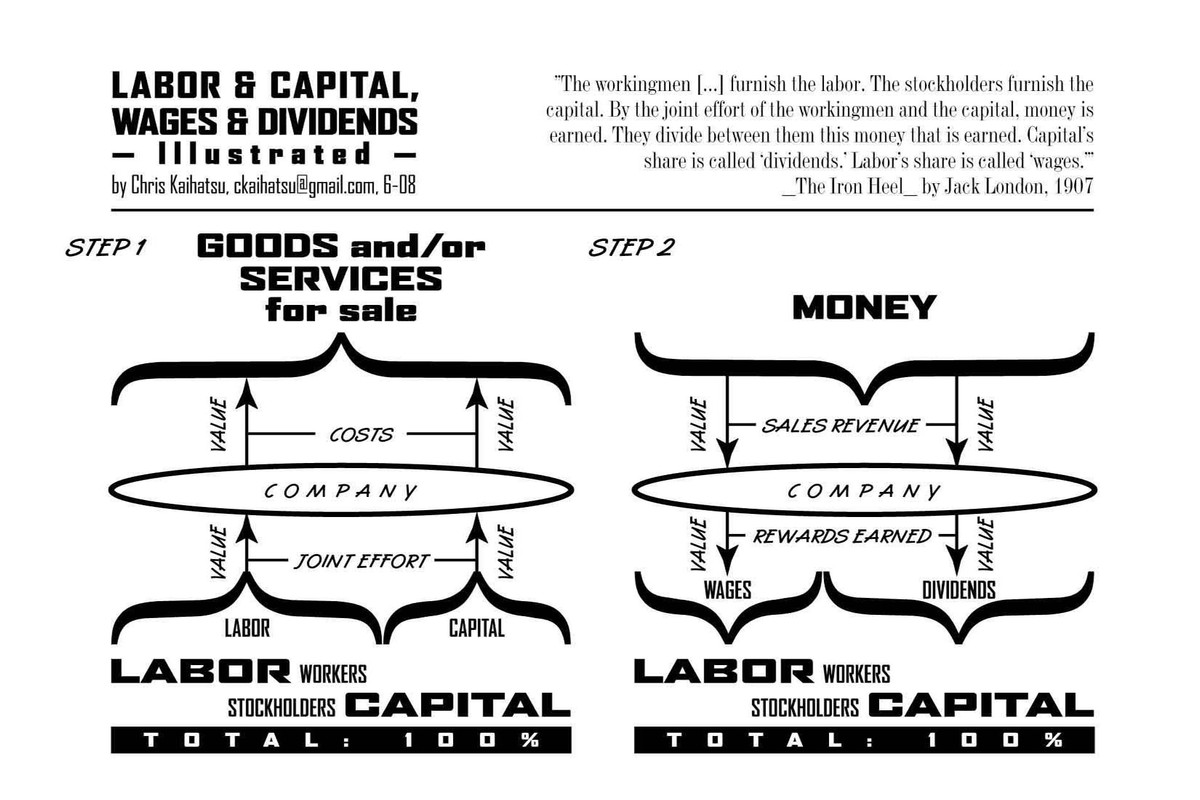- 31 Oct 2020 15:06
#15131645
Yup.
[11] Labor & Capital, Wages & Dividends
---
Yes, I think this is the *crux* of it all -- workers were hired to initially produce those tools, parts, and supplies, and also the factory building / equipment itself, yet they're not allowed to own or control that infrastructure that they themselves built. (I reworded it for you.)
First CityWide Change Bank 2 - Saturday Night Live
First CityWide Change Bank 1 - Saturday Night Live
Maybe society should just treat that ownership / 'entrepreneurial' role as any *other* white-collar-type work role, so that workers *can* keep their own surplus labor value. I'll note that there are plenty of 'creative' work roles in business that are *not* incentivized the same way, are not fetishized for their 'innovation', and are paid a regular white-collar salary.
No, it's actually *surplus labor value*:
https://en.wikipedia.org/wiki/Surplus_value
You're *glorifying* the role of the owner / entrepreneur, when such is simply a white-collar social-*organizational* role that's simply leveraging capital ownership, for the lion's share of the profits.
Since the time of industrialization 'volume' just means leaving the assembly-line conveyor belt on a little longer -- popularity for a product, plus the money to buy it, equals the gargantuan sales volume enjoyed by a company and its ownership. Here's how Wilde describes it:
---
Just refer to my economic 'reform', above -- instead of *private-property* ownership and control of capital / revenue / profits, workers should be able to *retain* all of their surplus labor value, and all business-organizational roles ('management') should just be regular salaried white-collar work roles, integrated into the larger corporate bureaucracy.
Julian658 wrote:
The workers assemble the computer and hence have added some value.
Yup.
[11] Labor & Capital, Wages & Dividends
Spoiler: show
---
Julian658 wrote:
The inventor and factory owner can only build a few computers on his own. The owner pays the assembly workers and for the job. Is a contractual transaction of labor exchange for cash.
Julian658 wrote:
With no tools, plans, training, parts, supplies, direction, and supervision the workers produce NOTHING. This is a KEY concept.
Yes, I think this is the *crux* of it all -- workers were hired to initially produce those tools, parts, and supplies, and also the factory building / equipment itself, yet they're not allowed to own or control that infrastructure that they themselves built. (I reworded it for you.)
Julian658 wrote:
Assume the computer inventor makes 50 dollars per computer once they are assembled. If the inventor does not have a high volume his effort is worthless. If he sells millions of computers he makes a lot of money. The secret to wealth creation is volume.
First CityWide Change Bank 2 - Saturday Night Live
First CityWide Change Bank 1 - Saturday Night Live
Julian658 wrote:
The inventor employs thousands of workers who get to spend their salaries elsewhere making someone else wealthy. The workers may decide they want to buy a video game. Whomever is making video games will sell a lot and become wealthy. If the inventor and creator does not take a profit. IN other words if he shares the profit with the workers then the owner has no incentive to invent, create, and innovate.
Maybe society should just treat that ownership / 'entrepreneurial' role as any *other* white-collar-type work role, so that workers *can* keep their own surplus labor value. I'll note that there are plenty of 'creative' work roles in business that are *not* incentivized the same way, are not fetishized for their 'innovation', and are paid a regular white-collar salary.
Julian658 wrote:
The origin of the wealth is creativity, innovation, organization, marketing, and lastly VOLUME.
No, it's actually *surplus labor value*:
https://en.wikipedia.org/wiki/Surplus_value
You're *glorifying* the role of the owner / entrepreneur, when such is simply a white-collar social-*organizational* role that's simply leveraging capital ownership, for the lion's share of the profits.
Julian658 wrote:
Without volume wealth accumulation is difficult. Wealth is no finite. Wealth is created. The amount of wealth in the world is much higher than in the past.
Since the time of industrialization 'volume' just means leaving the assembly-line conveyor belt on a little longer -- popularity for a product, plus the money to buy it, equals the gargantuan sales volume enjoyed by a company and its ownership. Here's how Wilde describes it:
Up to the present, man has been, to a certain extent, the slave of machinery, and there is something tragic in the fact that as soon as man had invented a machine to do his work he began to starve. This, however, is, of course, the result of our property system and our system of competition. One man owns a machine which does the work of five hundred men. Five hundred men are, in consequence, thrown out of employment, and, having no work to do, become hungry and take to thieving. The one man secures the produce of the machine and keeps it, and has five hundred times as much as he should have, and probably, which is of much more importance, a great deal more than he really wants. Were that machine the property of all, every one would benefit by it. It would be an immense advantage to the community. All unintellectual labour, all monotonous, dull labour, all labour that deals with dreadful things, and involves unpleasant conditions, must be done by machinery. Machinery must work for us in coal mines, and do all sanitary services, and be the stoker of steamers, and clean the streets, and run messages on wet days, and do anything that is tedious or distressing. At present machinery competes against man. Under proper conditions machinery will serve man.
https://www.marxists.org/reference/arch ... /soul-man/
---
Julian658 wrote:
There is a valid point in the left. The wealth creators are very few in number and own a very large share of the wealth of the world.
Perhaps the innovators need to pay more for services provided by the workers.
Just refer to my economic 'reform', above -- instead of *private-property* ownership and control of capital / revenue / profits, workers should be able to *retain* all of their surplus labor value, and all business-organizational roles ('management') should just be regular salaried white-collar work roles, integrated into the larger corporate bureaucracy.




 Yes, I suppose so, but that is completely irrelevant to modern society. You're making a really stupid point, that makes no sense, all in an attempt to push your fucked up narrative that we're all equal. It's false. Most people have different starting points.
Yes, I suppose so, but that is completely irrelevant to modern society. You're making a really stupid point, that makes no sense, all in an attempt to push your fucked up narrative that we're all equal. It's false. Most people have different starting points.










 - By late
- By late